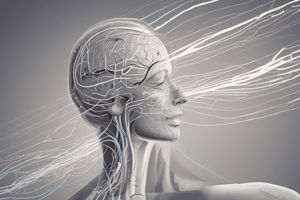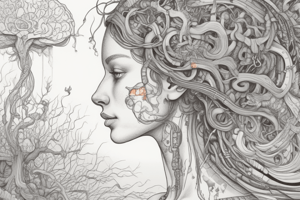Podcast
Questions and Answers
Excitatory neurons release the neurotransmitter _____________, while inhibitory neurons release the neurotransmitter ________________.
Excitatory neurons release the neurotransmitter _____________, while inhibitory neurons release the neurotransmitter ________________.
glutamate, GABA
Select all the patients who are at MOST risk for seizures:
Select all the patients who are at MOST risk for seizures:
- A 63-year-old whose CT scan shows an ischemic stroke. (correct)
- A 72-year-old who is post op day 5 from open heart surgery.
- A 58-year-old experiencing ETOH withdrawal. (correct)
- A 32-year-old with a blood glucose of 20 mg/dL. (correct)
- A 16-year-old with bacterial meningitis. (correct)
Based on a Phenytoin level of 7 mcg/mL, what should the nurse do?
Based on a Phenytoin level of 7 mcg/mL, what should the nurse do?
- Hold the next dose of Phenytoin
- Continue to monitor the patient
- Initiate seizure precautions (correct)
- Assess the patient for a rash
Which statement requires re-education about seizure triggers?
Which statement requires re-education about seizure triggers?
A patient experiencing a tonic-clonic seizure is experiencing a focal (partial) seizure.
A patient experiencing a tonic-clonic seizure is experiencing a focal (partial) seizure.
What type of seizure is characterized by a child appearing to daydream for 10 seconds and not recalling the event afterward?
What type of seizure is characterized by a child appearing to daydream for 10 seconds and not recalling the event afterward?
What should the nurse do when a patient reports having déjà vu and seeing spots in their visual field?
What should the nurse do when a patient reports having déjà vu and seeing spots in their visual field?
If a tonic-clonic seizure lasts more than 5 minutes, the nurse should?
If a tonic-clonic seizure lasts more than 5 minutes, the nurse should?
Flashcards are hidden until you start studying
Study Notes
Neurons and Neurotransmitters
- Neurons transmit information and come in two main types: excitatory and inhibitory.
- Excitatory neurons release glutamate, while inhibitory neurons release GABA.
Patients at Risk for Seizures
- Patients at most risk for seizures include those with:
- Low blood glucose (20 mg/dL)
- Ischemic stroke
- Bacterial meningitis
- Alcohol withdrawal
- Post-operative patients, like those on day 5 post-open heart surgery, are not at increased seizure risk compared to others listed.
Phenytoin and Seizure Precautions
- Normal Phenytoin levels range from 10 to 20 mcg/mL; a level of 7 mcg/mL indicates under-medication.
- Initiate seizure precautions for patients with low Phenytoin levels to prevent seizures.
Seizure Triggers Education
- Alcohol intake should be strictly limited or avoided altogether to prevent seizures.
- Recognize that hormonal changes (like those during menstrual cycles), sleep deprivation, and dehydration can trigger seizures.
Types of Seizures
- Tonic-clonic seizures are generalized, affecting both brain hemispheres.
- Absence seizures, common in children, are characterized by short episodes of staring, resembling daydreaming.
Recognizing Seizure Auras
- Auras, such as déjà vu or visual disturbances, are warning signs of impending seizures.
- It is crucial to gently lay the patient on their side, ensuring safety, and remove any tight clothing.
Managing Prolonged Seizures
- Tonic-clonic seizures typically last 1-3 minutes; anything over 5 minutes requires emergency intervention.
- If a seizure lasts more than 5 minutes, do not restrain the patient but activate the emergency response system to ensure proper care.
Studying That Suits You
Use AI to generate personalized quizzes and flashcards to suit your learning preferences.




